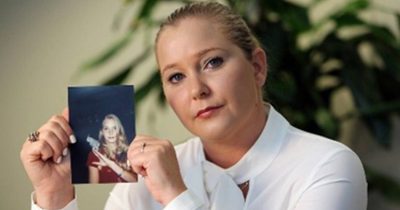
Service dogs provide invaluable help and companionship to those who need it. These loyal dogs are ready to follow their owners anywhere they go.
Like one golden retriever, who is the service dog to a neuroscientist and helps his friend in the lab — and with his own labcoat and protective gear, he looks the part of a real scientist.
Joey Ramp, from Champagne, Illinois, is a former horse trainer who suffered a serious injury in a 2006 riding accident. According to SWNS, she damaged her prefrontal cortex and suffered permanent nerve damage, and still has PTSD from the incident.
Luckily, she has a loyal service dog named Sampson to help her out.
With Sampson by her side assisting her, Joey returned to education to pursue a career as a neuroscientist. She has received two BAs and is pursuing her PhD, while working as a lab assistant at the University of Illinois.
And she has kept Sampson by her side, even at work: the dog has become the first-ever service dog to be granted access to the school’s chemistry labs.
Sampson makes the job safer and easier for Joey: “If I drop something in the lab, he’ll come to my side, and I can use him as a brace to kneel down and pick up what I need,” Joey told SWNS.
“I couldn’t possibly navigate academics or a neuroscience program without his assistance.”
And every precaution is taken to protect Sampson, too. The dog still follows scientific safety protocols, with his very own lab coat and PPE equipment:
But service dogs aren’t always welcome in labs, which could prevent people with disabilities from pursuing STEM careers and education.
Joey, a disability advocate, is hoping that Sampson will change people’s views.
“I really want people to start understanding that service dogs have a very high level of training,” she said. “They provide independence and keep their handler healthy, happy, and able to go about life in ways they wouldn’t be able to do without their service dog.”
“People with disabilities do want to study science and to look at people with disabilities and service dog handlers with a view of making things more accessible to them is really important and it’s time.”
Good boy, Sampson! We’re glad this service dog is allowed to assist his owner in the lab. We hope more places start allowing this, making it easier for people with disabilities to work in STEM fields.
Share this inspiring story to spread the word about the important work of service dogs in science labs.




